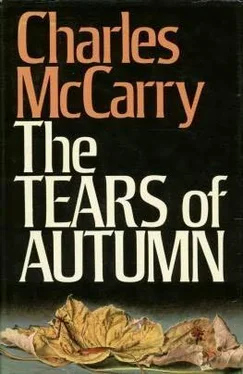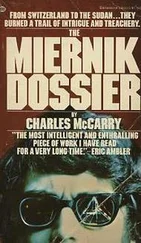After Dienbienphu, Glavanis went directly to Algeria, where he was shot in the chest by an Arab terrorist while sitting in a cafe in Oran. He lost a lung as a result of his wound, and Christopher recruited him a week after he was invalided out of the Legion, offering him the prospect of going into action against Communists.
In Vietnam and later in Algeria, during periods when he was recovering from wounds, Glavanis had headed military interrogation teams. He knew a great deal about the natives who had passed through his hands; because the French had lost both wars, many of the people they had tortured were now generals or government ministers or high party officials.
Christopher had often used Glavanis as a source of information, and once or twice as a courier. But he had never until now needed him for his primary skills.
Christopher took Glavanis and Eycken to his rented car, parked in a dark street by the Forum. Glavanis stood for a moment, gazing at the broken columns. “I miss Greece,” he said, “these stones remind me.” He lifted his hips off the seat when he got into the front seat, and reached into his pocket. Christopher opened the small box Glavanis handed him and found a gold-plated fingernail clipper inside: the Greek never called on a friend without bringing a gift.
When they drove through the gates of the villa on the Via Flaminia, Glavanis said, “My God, Paul-what is this place?”
The villa, a long, towered building, lay at the end of a drive that passed between perfectly matched cypresses. Gravel walks led through the grounds, past statues and fountains, hedges and fish ponds, flower beds and water jokes-a passerby could be soaked by a hidden jet in any of a dozen places. There was one stretch of walk where fountains formed an arch over the path for a distance of a hundred meters, so cleverly designed that not a drop of water fell on anyone who walked beneath the spray.
“It belonged to some Roman nobility, and afterward to one of Mussolini’s mistresses,” Christopher said. “Late in the war, the SS used it as an interrogation center for important prisoners -after that, nobody wanted it.”
The Rome station had furnished the villa with black leather furniture, antique tables left behind by the Italians and the Germans, and thick carpeting that absorbed the echoes thrown out by the tile floors. An elaborate alarm system that covered the grounds with electric eyes and the interior of the villa with devices that sensed the heat of an intruder’s body had been installed. The bar was stocked with the national drinks of five continents and the library contained books in twenty languages. There was a photographic dark room, a small cinema, a gymnasium. The villa was a place for new agents to be trained and old ones to rest.
Webster had arranged for the young officers who guarded the place to be sent away on Christmas leave. The old-fashioned German microphones implanted in the plaster had been replaced with voice-activated transmitters, and Christopher did not for a moment believe that he had been told where all the bugs were located. He took Glavanis and Eycken outside to explain what he wanted from them.
Glavanis asked only one question: “Is this man a Communist?”
“He works for them,” Christopher said.
Glavanis, standing at the bar, grinned and drank from a glass of ouzo, taking in a noisy breath as he swallowed.
Eycken, who had the face of a suspicious shopkeeper, raised immediate objections. Christopher listened, knowing that it was Glavanis who would set a price on the services of his friend.
“The time element is very short,” Eycken said. “We have to drive all the way to Calabria, take this man out of a guarded house, drive all the way back to Rome. And break him. All in three days or less. What if he doesn’t break?”
“He’ll break,” Christopher said.
He motioned for Glavanis and Eycken to follow him. Glavanis refilled his glass from the bottle of ouzo he had carried into the garden. The three men strolled around the villa, gravel crunching beneath their shoes. In a thick grove of cypresses, a hundred yards behind the villa, Christopher knelt and pulled a lever hidden in a concrete chamber at the base of a tree.
A spring-loaded steel manhole cover opened at their feet. Christopher shone his flashlight into the hole. Twelve feet below, the round beam of the electric torch moved over a damp stone floor.
“Eycken, get in,” Christopher said.
Eycken gave him a hard look and stepped back from the edge. He didn’t move his hands, but Christopher felt his tension.
“It’s all right,” Christopher said. “It’s just an experiment.”
Glavanis nodded; Eycken held out his hand for the flashlight. Christopher gave it to him, and he put it in his pocket and swung athletically into the hole, hanging for a moment by his fingertips before he dropped into the darkness.
“I’m going to close the hatch,” Christopher said. “You’ll see us again in five minutes.”
He turned Glavanis around and showed him that it was impossible to see the villa from where they stood. The house stood in open countryside, and there was no noise and no light.
They went back into the villa. Christopher led Glavanis down the cellar stairs, and then into a long concrete tunnel with strong light bulbs screwed into the ceiling. At the end of the tunnel, Christopher stopped before a rusted steel door.
“Eycken has been in there alone for five minutes, with a flashlight,” Christopher said. “Look at his face, and use your imagination.”
He threw a light switch and pulled open the door. Eycken was standing against the far wall of a bare round concrete room ten feet in diameter. The walls sloped inward like the sides of an inverted funnel. Eycken shielded his eyes from the blinding reflection of high-intensity lights. The walls were painted with white reflective paint.
Eycken held a heavy revolver in his hand. Glavanis stepped between him and Christopher. “It was a joke, Jan,” he said.
Eycken swore, a long elaborate Arab curse, and moved around to the door before he put his gun away.
Christopher explained that the Germans had built the room. During the war they would bring a man through the dark fields, strip him, and drop him through the trapdoor. He would be left naked in the dark room, sometimes with a dozen rats, sometimes with music or recorded human screams playing at high volume through the loudspeakers in the wall. The door was faced with concrete and cleverly concealed; it was impossible to tell that it was there by sense of touch. When, after two or three days, the wall opened and the lights went on, and the prisoner-already half-crazed by thirst and the rats and the loudspeakers-saw a German in an SS uniform standing in the door, it had a certain effect.
“Is that how we begin with this Communist?” Glavanis asked.
“Yes. You may not have to do much more. He’s used to being protected, being invulnerable. He thinks of himself as a dangerous man. That’s one of the pressure points-he won’t know how to handle being helpless. Also, he’s a hypochondriac. He’s going to get very cold in here with no clothes on, and he’s going to be worried about pneumonia.”
“Can we use water?”
“If you have to,” Christopher said. “I don’t know that it’ll be necessary. I have something to keep him quiet when you take him, and when we let him go.”
“You’re going to let him go?”
“Yes. Don’t let him see your faces at all. You’ll have to tape his eyes as soon as you take him.”
Eycken smiled, his white teeth glittering beneath the hair on his lips. “I’d better shave,” he said.
“Afterward would be better,” Christopher said. “I want you to start in the morning. You fly to Reggio and pick up the car there. Stavros, you still have the papers I gave you? The car is booked in that name, at Auto Maggiore at the airport.”
Читать дальше












